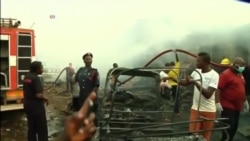WASHINGTON —
Experts say a slow international response to Boko Haram's crimes in Nigeria has contributed to its rise from a group of marauding militants into an Islamist insurgency and broader threat. A U.S. congressional panel held a hearing Wednesday to get updates on the group that has wreaked havoc in northeastern Nigeria for the past five years.
New Jersey Republican Chris Smith, who chairs the House of Representatives Foreign Affairs Subcommittee on Africa, Global Health, Global Human Rights, and International Organizations, related his impressions from a recent visit to Nigeria. He said Boko Haram's violence is no longer affecting only Christians.
"I met with a Muslim father of two girls abducted from the Chibok school. Fighting back tears, he said the agony was unbearable - and this is a Muslim father. The story of his daughters underscores the fact that Boko Haram brutalizes Muslims as well," said Smith.
Smith said the brazen abduction of more than 200 school girls in the northern Borno state in April has finally brought international attention to the group's heinous crimes.
Human rights lawyer Emmanuel Ogebe said a slow international response contributed to the rise of what is now "the second deadliest terror group in the world" after the Taliban.
"When I was Nigeria in April, the average deaths a week were approximately 100. In the four days we were in Nigeria last week, the average was 100 a day," said Ogebe.
Peter Pham, director of the Atlantic Council's Africa Center, said Boko Haram has grown from a loose group of gunmen into a full-fledged insurgency with help from foreign jihadists in Africa, especially in Somalia and Mali.
"Following the French intervention in Mali, the militants, possibly accompanied by a few foreign nationals, returned to northern Nigeria, not only with training and some combat experience in desert warfare, but also vehicles and heavy weapons, including shoulder-fired missiles," said Pham.
These weapons enabled Boko Haram to attack the government's military facilities to seize more and better weapons. Pham said corruption of local officials and a lack of development in northern Nigeria have made Boko Haram's call for a radical change attractive to some people. However, he added, the real problem is the federal government's lax response to the threat.
Former U.S. ambassador Robin Sanders said Nigeria's security forces have neither the experience nor the means to fight the ever moving terrorists.
"The bomb detection equipment is quite rudimentary and they certainly need improved control over the porous borders as we've already heard from my colleagues. They need improved military planning, logistics, equipment supplies, including sufficient spare parts and fuel," said Sanders.
The Nigerian government also lacks special forces to combat terrorism.
Sanders warned that the battle to contain Boko Haram will be a long one. Lawmakers were also told that the group now poses a danger to U.S. citizens anywhere in the world.
New Jersey Republican Chris Smith, who chairs the House of Representatives Foreign Affairs Subcommittee on Africa, Global Health, Global Human Rights, and International Organizations, related his impressions from a recent visit to Nigeria. He said Boko Haram's violence is no longer affecting only Christians.
"I met with a Muslim father of two girls abducted from the Chibok school. Fighting back tears, he said the agony was unbearable - and this is a Muslim father. The story of his daughters underscores the fact that Boko Haram brutalizes Muslims as well," said Smith.
Smith said the brazen abduction of more than 200 school girls in the northern Borno state in April has finally brought international attention to the group's heinous crimes.
Human rights lawyer Emmanuel Ogebe said a slow international response contributed to the rise of what is now "the second deadliest terror group in the world" after the Taliban.
"When I was Nigeria in April, the average deaths a week were approximately 100. In the four days we were in Nigeria last week, the average was 100 a day," said Ogebe.
Peter Pham, director of the Atlantic Council's Africa Center, said Boko Haram has grown from a loose group of gunmen into a full-fledged insurgency with help from foreign jihadists in Africa, especially in Somalia and Mali.
"Following the French intervention in Mali, the militants, possibly accompanied by a few foreign nationals, returned to northern Nigeria, not only with training and some combat experience in desert warfare, but also vehicles and heavy weapons, including shoulder-fired missiles," said Pham.
These weapons enabled Boko Haram to attack the government's military facilities to seize more and better weapons. Pham said corruption of local officials and a lack of development in northern Nigeria have made Boko Haram's call for a radical change attractive to some people. However, he added, the real problem is the federal government's lax response to the threat.
Former U.S. ambassador Robin Sanders said Nigeria's security forces have neither the experience nor the means to fight the ever moving terrorists.
"The bomb detection equipment is quite rudimentary and they certainly need improved control over the porous borders as we've already heard from my colleagues. They need improved military planning, logistics, equipment supplies, including sufficient spare parts and fuel," said Sanders.
The Nigerian government also lacks special forces to combat terrorism.
Sanders warned that the battle to contain Boko Haram will be a long one. Lawmakers were also told that the group now poses a danger to U.S. citizens anywhere in the world.





